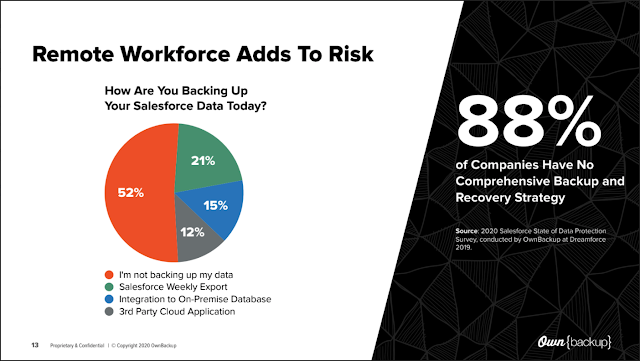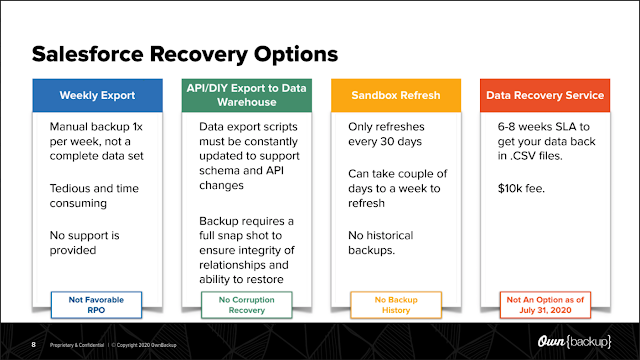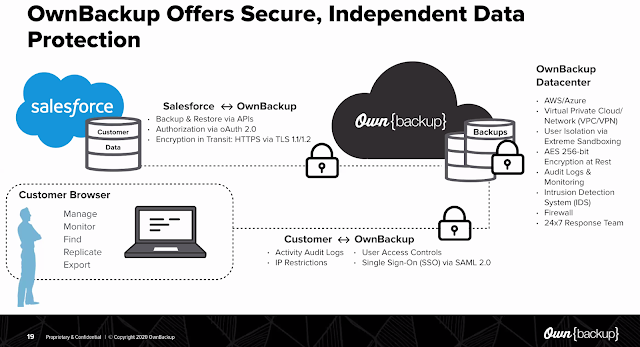 OwnBackup, emerging leader in Salesforce data protection, delivered an interesting presentation during a new online session for the 34th IT Press Tour.
OwnBackup, emerging leader in Salesforce data protection, delivered an interesting presentation during a new online session for the 34th IT Press Tour.The company was incorporated in March 2012 and developed the product during 3 years. Originally, the product was initiated by Ariel Berkman during his last 3 years at Recover Information Technologies Ltd. he founded in 2006. Several key members of OwnBackup came from Intronis founded in 2003 and sold to Barracuda Networks for $60M in 2015. Sam Gutmann joined OwnBackup as CEO in 2015 where he met again Ori Yankelev, currently EVP Sales, and business has started at that moment. OwnBackup has raised a total of $49.8M with 5 VC rounds.
But the key question if why do we need to protect our Salesforce data? Each word here is important i.e protect, data, our and Salesforce. Yes you read right Salesforce doesn't do that and it's a a big surprise. It's also a surprise that users finally pick the CRM service thinking, for some of them, that they will be protected by the cloud provider and for others preferring the service even without a comprehensive protection. I mean that these users expose companies' data to a loss therefore impacting seriously the business of their company.

It's incredible that users accept this lack from a SaaS vendor. Being an IaaS is different but for a SaaS this is purely inadequate as users subscribe to a high-level service and not an infrastructure platform. The power and position of Salesforce are so high that they finally don't care, this is our understanding, and it doesn't impact their image and results. And don't think Salesforce never fails, I invite you to read an article I wrote on StorageNewsletter May 21, 2019 about a 15 hours downtime.
To summarize Salesforce data protection answers, here are the ridiculous four options:

But enterprises require more than that.
A backup solution for such business critical service requires some specific attributes like:
- Strong RPO to avoid to lose data,
- Short RTO to restart business rapidly,
- Of course data integrity,
- Security as a must,
- Reliability as it is often the last copy so you have to trust the solution and the partner
- and finally accessibility.
OwnBackup develops probably the most advanced product today dedicated to Salesforce. It is coupled with an archiver, a replicator, a compare and comply companions. All these are CCPA and GDPR certified.
The backup product runs on AWS and Azure connected to Salesforce instances via APIs. Data are transferred encrypted via HTTPS or TLS 1.1/1.2 and stored encrypted with AES-256 as well. The service leverages the IAM OAuth 2.0 for better security.

Direction of the product targets RPO with the wish to limit the data exposure to a loss. In other words, able to put in production rapidly old data is useless. RPO is before the failure and RTO is after it. Let me give you 3 good examples of RPO and RTO:
- Source code: you don't want to lose any code so you need a small RPO but you have plenty of time to restore it so RTO is flexible.
- Static website: like a museum can tolerate an RPO of several weeks but a very short RTO. In other words as soon as you discover the failure.
- business case: you don't want to lose a basket or a pending transaction and restore activity very very quickly. Here you rely on short RPO and RTO.
For Salesforce, we understand that the last example is the goal for users and backup providers. And the ultimate goal is a CDP - Continuous Data Protection - model with a constant copy of new data to a secondary space. The RPO is the second before the failure meaning that the loss is associates to data entered in the system between 2 seconds which is a big gain.
2020 will be interesting for this topic and we'll follow closely OwnBackup we expect the solution to also cover other key SaaS applications.




















0 commentaires:
Post a Comment